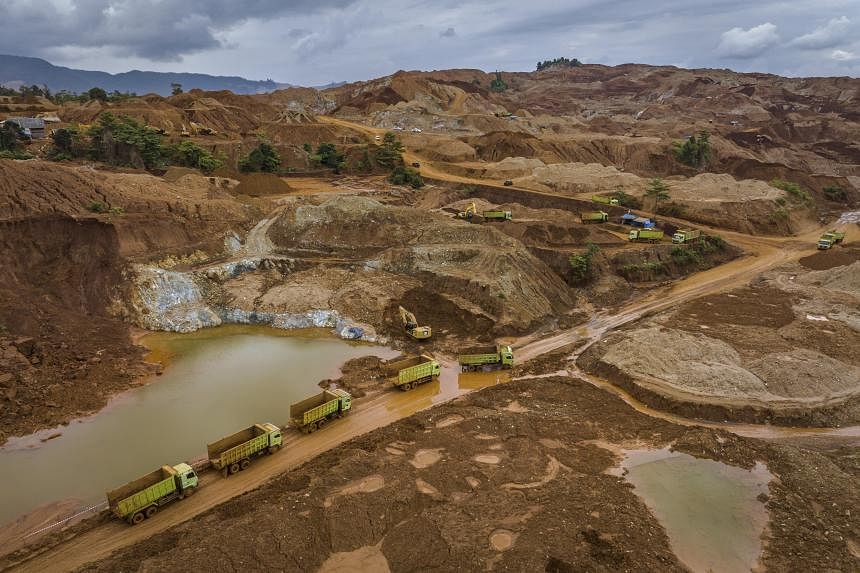JAKARTA – Indonesia’s booming nickel industry is coming under increasing scrutiny from graft busters over alleged corruption, amid the rapid expansion of smelters and with more money pouring in from hopeful investors.
Several national and regional government officials are facing trial or being investigated for alleged bribery linked to the issuance of mining permits in major nickel ore-producing regions in Sulawesi and the North Maluku islands.
The alleged corruption has led to loss of revenue for the government, and caused large-scale environmental destruction that has jeopardised the livelihood of rural communities and resulted in frequent land disputes.
Indonesia’s mining industry has been booming in the last few years as global players rush in to mine and process nickel, one of the main components used in batteries for electric vehicles (EVs). Indonesia produced an estimated 40.2 per cent of the world’s nickel in 2023, according to S&P Global Market Intelligence data.
South-east Asia’s largest economy is the world’s biggest producer of nickel, and holds nearly a quarter of global nickel reserves.
Nickel smelting facilities have sprouted in Indonesia in recent years, and many were built by investors from China, the world’s largest auto exporter and EV battery maker today.
The government expects more than US$30 billion (S$40.9 billion) in investments in the EV battery supply chain to flow in by 2026, a top investment official said in 2023.
There were 44 nickel smelters in operation as at October 2023, with another 19 under construction and feasibility studies being conducted on seven others, the Industry Ministry, which oversees standalone nickel smelters, told The Straits Times.
Indonesia’s Corruption Eradication Commission (KPK) will on May 2 begin a trial against former North Maluku governor Abdul Ghani Kasuba, who allegedly accepted kickbacks of around US$60,000 from local major player Harita Nickel in exchange for permits.
In a pre-trial hearing on April 23, Mr Stevi Thomas, a director of Harita Nickel, admitted giving bribes to Mr Kasuba four times, with the first one made on Aug 1, 2023, worth US$7,000.
“I gave (him) the money because I was asked, and I felt pity,” he was quoted as saying by Antara news agency, in response to a question from the presiding judges.
In response to ST’s query, Harita Nickel’s corporate secretary Franssoka Sumarwi said the company would respect ongoing legal proceedings and “continue to work with the authorities as appropriate”.
In another case heard in March, prosecutors sought a five-year jail sentence for Mr Ridwan Djamaluddin, former director-general for minerals and coal at the Energy and Mineral Resources Ministry.
Mr Ridwan allegedly simplified the evaluation required for the approval of the mining plan and budget that includes mining quotas, called RKAB.
The change in the RKAB allegedly gave leeway to miners who had dug up nickel reserves in their concessions to get an extra mining quota in other concessions owned by miners with valid permits.
That case is estimated to have resulted in a 5.7 trillion rupiah (S$480 million) loss of revenue for the government, according to local media reports.
In another closely watched investigation, the Mining Advocacy Network (Jatam), a local non-governmental organisation, in March reported Investment Minister Bahlil Lahadalia to the KPK.
Jatam accused Mr Bahlil of accepting bribes from mining companies to restore the permits for concessions that were scrapped by President Joko Widodo’s administration due to under-utilisation.
Mr Bahlil is the chief of a task force in charge of evaluating mining permits and land-use business permits.
“So far, the (Jatam) report is being verified and assessed by the KPK’s public complaint department,” KPK spokesman Ali Fikri told The Straits Times. The Investment Ministry did not respond to ST’s request for comment.
Mr Sugeng Suparwoto, chairman of Parliament’s Commission VII, which oversees energy, said on March 5 that he had received complaints from a local mining business group – which he did not name – about irregularities at the task force. These included those over demands for money and even shares in companies that wanted to restore their revoked permits, Kompas TV reported.
In a Parliament hearing on April 1, Mr Bahlil denied the accusations. “We revoked the permits based on the recommendation of the technical ministry,” he said, referring to the Energy and Mineral Resources Ministry.
The rush to mine nickel to cash in on the rise in EV sales globally has resulted in rampant corruption, said Mr Ferdian Yazid, a programme manager at the Indonesian chapter of global corruption watchdog Transparency International.
“Companies need to secure licences from the government to conduct operations in a mining block. It often requires more than their mining expertise or financial capability to get the permits. One of the determining factors is close ties with those in the government,” he alleged.
In a report released on Feb 26, Transparency International Indonesia claimed that Indonesia’s political elite and government officials at both the national and local levels were involved in massive corruption in the nickel-rich regions of Central Halmahera and East Halmahera, part of the North Maluku province in eastern Indonesia.
Mr Ferdian said one of the ways to improve governance in Indonesia’s nickel sector would be pressure from nickel buyers.
“It is expected that buyer countries pay attention to the environmental impact of nickel mining, how the companies secure their permits, and whether they are tied to political figures,” he said. “But, that does not happen now.”
Another way to reduce corruption is by making transparent the approval process to get mining quotas, said Mr Yusri Usman, executive director of the Centre of Energy and Resources Indonesia. This would include the authorities disclosing the monthly production plan and realised output of each company, and making this information publicly available.
“This will allow for better supervision by the public, including workers and people living near the mining sites,” he said.
At present, the information available to the public is only the names of the companies that have received the mining quota, the time of permit issuance and the type of permit.
The Energy and Mineral Resources Ministry’s spokesman Agus Cahyono Adi told ST that in the wake of the corruption cases involving government officials, the ministry continues to improve its governance and encourage good corporate practices. He did not elaborate further.
Mr Putra Adhiguna, managing director of Jakarta-based energy finance think-tank the Energy Shift Institute, said the government has outlined plans to implement tracing to clarify the source of minerals. The government also wants to promote compliance with mining standards.
But he noted that tracing needed to be complemented by law enforcement, and that buyers too needed to be circumspect about where their nickel was coming from.
“Compliance in commodities can be challenging to trace, and the risk further escalates when the buyers are less cautious about their supply-chain legal compliance,” he told ST.
A report by US-based environmental advocacy group Mighty Earth released on April 16 alleged that miners in Sulawesi, some linked to Chinese EV battery producers, cleared protected forests at a rapid rate.
The resulting environmental damage and rapid deforestation has threatened the livelihood of the indigenous Bajau people, also known as the world’s last “sea nomads”, according to the report.
“Nickel mining is dirty, that’s just how it is, but there are ways to do it more responsibly,” Ms Amanda Hurowitz, the group’s senior director of forest commodities, said at the launch of the report.
She said it would take “political will” for Indonesia to clean up its nickel supply chain, citing its laborious progress in tackling deforestation in the palm oil industry.


